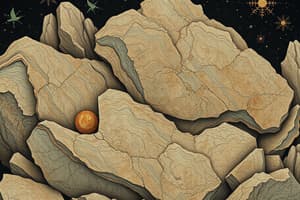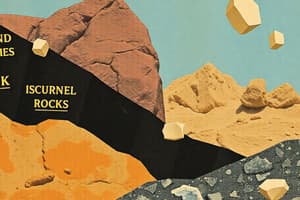Podcast
Questions and Answers
Rocks are classified as igneous, sedimentary, or metamorphic based primarily on their?
Rocks are classified as igneous, sedimentary, or metamorphic based primarily on their?
method of formation
When granite melts and then solidifies, it becomes?
When granite melts and then solidifies, it becomes?
an igneous rock
Which statement about the rock cycle is NOT true? (Select the correct option)
Which statement about the rock cycle is NOT true? (Select the correct option)
- A sedimentary rock in the future may change into another type of sedimentary rock
- Cementation is a process that leads to sedimentary rocks
- Solidification is always needed to form an igneous rock
- When heat is applied to a rock and it melts, it may form a metamorphic rock (correct)
The burial process involving sedimentary rocks is usually?
The burial process involving sedimentary rocks is usually?
The solidification of magma produces?
The solidification of magma produces?
Which statement about a metamorphic rock is not supported by the rock cycle?
Which statement about a metamorphic rock is not supported by the rock cycle?
The process of uplift is essential to the rock cycle for?
The process of uplift is essential to the rock cycle for?
The crystals of many metamorphic rocks are aligned in bands as a result of?
The crystals of many metamorphic rocks are aligned in bands as a result of?
Which statement about an igneous rock is not supported by the rock cycle?
Which statement about an igneous rock is not supported by the rock cycle?
Uplift, weathering and erosion lead to formation of?
Uplift, weathering and erosion lead to formation of?
Which sedimentary rocks are clastic and consist of particles that have diameters smaller than 0.006 centimeter?
Which sedimentary rocks are clastic and consist of particles that have diameters smaller than 0.006 centimeter?
Larger crystal size in one of two igneous rocks of similar composition usually indicates that the rock with the larger crystals cooled for?
Larger crystal size in one of two igneous rocks of similar composition usually indicates that the rock with the larger crystals cooled for?
What do most igneous, sedimentary, and metamorphic rocks have in common?
What do most igneous, sedimentary, and metamorphic rocks have in common?
In which group do the rocks usually have the mineral quartz as a part of their composition?
In which group do the rocks usually have the mineral quartz as a part of their composition?
Which two igneous rocks could have the same mineral composition?
Which two igneous rocks could have the same mineral composition?
Different arrangements of tetrahedra in the silicate group of minerals result in differences in the minerals'?
Different arrangements of tetrahedra in the silicate group of minerals result in differences in the minerals'?
The mineral mica breaks evenly along flat sheets mainly because of its?
The mineral mica breaks evenly along flat sheets mainly because of its?
Which mineral bubbles when acid is placed on it?
Which mineral bubbles when acid is placed on it?
Scratching a mineral against a glass plate and rubbing a mineral on a streak plate are helpful procedures for determining a mineral's?
Scratching a mineral against a glass plate and rubbing a mineral on a streak plate are helpful procedures for determining a mineral's?
Which 2 elements listed below are most abundant by weight in the Earth's crust?
Which 2 elements listed below are most abundant by weight in the Earth's crust?
Flashcards are hidden until you start studying
Study Notes
Rock Classification
- Rocks are categorized into igneous, sedimentary, and metamorphic based on their method of formation.
- Igneous rock, such as granite, forms when molten material cools and solidifies.
Rock Cycle Facts
- Cementation is crucial in forming sedimentary rocks, while melting transforms rocks into magma, leading to igneous formations, not metamorphic ones.
- Sedimentary rocks may transition into different types of sedimentary rocks over time.
Sedimentary Rock Formation
- Sedimentary rocks typically form in water environments due to burial processes.
- Uplift, weathering, and erosion produce sediments that contribute to sedimentary rock formation.
Metamorphic Rock Characteristics
- Metamorphic rocks can become sediments or may undergo melting, but they do not form through the process of cementation.
- Heat and pressure cause the crystals in many metamorphic rocks to align in bands.
Igneous Rock Traits
- Not all igneous rocks become sedimentary rocks; they can also undergo remelting and solidification into different igneous rocks.
- An igneous rock's history includes being in a liquid state at some point, and it can also experience metamorphism.
Sedimentary Rock Types
- Clastic sedimentary rocks like siltstone and shale consist of particles smaller than 0.006 centimeters in diameter.
Igneous Rock Properties
- Larger crystals in igneous rocks indicate longer cooling periods compared to smaller-crystal counterparts.
Commonality Among Rock Types
- All igneous, sedimentary, and metamorphic rocks are primarily composed of minerals.
Mineral Composition
- Rocks such as granite, rhyolite, sandstone, and hornfels typically contain quartz.
- Gabbro and basalt may share mineral compositions despite different textural appearances.
Silicate Minerals
- Variations in tetrahedra arrangements in silicate minerals lead to differences in hardness, cleavage, and crystal shape.
Mineral Characteristics
- Mica's ability to break along flat sheets is due to its atomic arrangement.
- Calcite reacts with acid, producing bubbles, serving as an identification test.
Mineral Identification Techniques
- Scratching minerals against glass or rubbing them on a streak plate aids in determining their identity.
Earth's Crust Composition
- Silicon and oxygen are the two most abundant elements by weight in the Earth's crust.
Studying That Suits You
Use AI to generate personalized quizzes and flashcards to suit your learning preferences.




